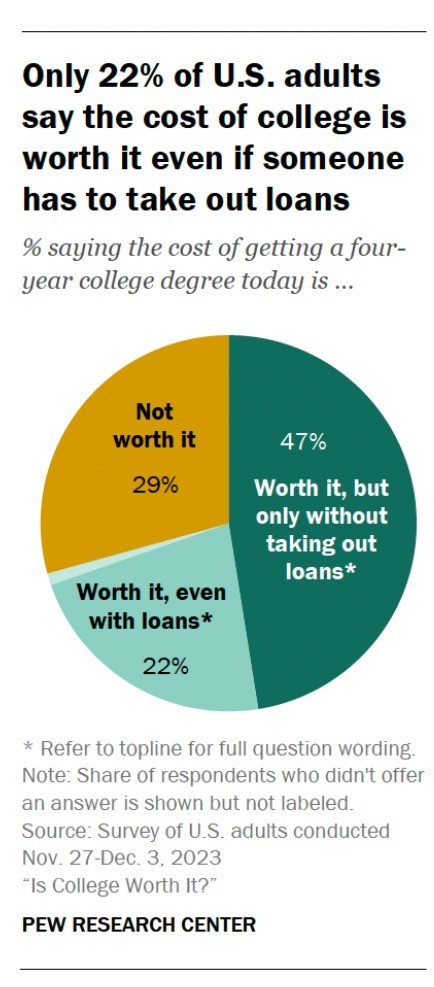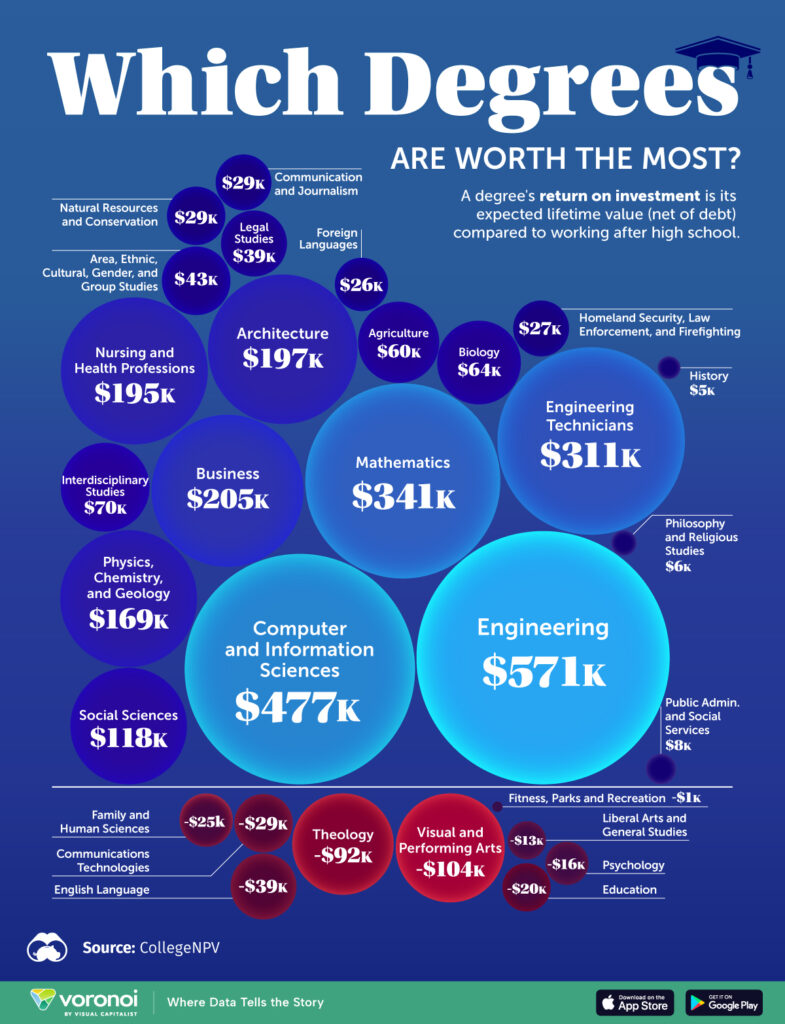While a formal education is still a worthwhile investment and holds immense value, there are aspects that are not being considered when they should be given the amount of resources we have.
For parents and grandparents who guide and help fund your children’s and grandchildren’s education, here’s what you need to consider – the return on the investment (ROI) of a college education. Some degrees are simply not worth pursuing, college isn’t for everyone and there’s a fine line between reasonable and absurd student debt. While this may sound harsh, it is the world we now live in.
What someone values and is good at may not be what the world values. In high school, students are exposed to some collegiate level courses either in a selection of electives or AP courses. Then there are extracurricular activities where many students shine and are rewarded in front of large groups of spectators and audiences including parents and grandparents. These often become the focal point for what translates into passions and future college pursuits. However, this old school approach of “college for all” is beginning to wane. Students Want to Learn More About Careers. Will High Schools Step Up?
Going to college with the sole intent of obtaining a degree at whatever the cost used to be the strategy for a better life. That is no more. 
Students (with support of their parents) take out college loans with the idyllic belief that this formal education will help them launch a high-paying career that will pay off their misunderstood debt and set them up for success for their lifetime. The fact is significant numbers of Americans are being outearned by those with less education suggesting that many college students and their parents don’t realize how much or how little degrees are worth in the world of work. Student loan crisis reflects underlying ROI Crisis (opinion)
I’ll use myself as an example. In high school, I was immensely good at biology. I would literally ace (100%) the tests because much of it was memory driven. Since I’m a highly visual learner, (Learning Style) this wasn’t hard to do. Plus, I really liked writing biology research papers which became my “passion.” I was also first chair/section leader of the clarinet section in a band that has won national honors and marched in the famed Rose Bowl parade.
However, when I got to college to major in biology with an academic scholarship, I found I literally passed out at the sight of blood. There are no careers outside of the medical, pharmaceutical, laboratory or teaching fields to successfully use a biology degree. How exactly was I eventually going to make a living when even the thought of dissecting a frog was enough for me to drop the class and seriously consider something else. Even with a music scholarship, I wasn’t remotely good enough to make it a career choice.
Just like there is a “fit” for a particular job or company, there is also a “fit” for a college/university and degree. This graphic shows the average return on investment of a degree in the U.S. based on analysis from CollegeNPV of data from the U.S. Department of Education and Bureau of Labor Statistics. This will vary depending of the cost of the institution, the specific degree received, and actual career path taken. The return on investment of a degree is the expected lifetime value of the degree (net of debt) compared to entering the workforce after high school.

College used to be viewed as time to have fun, experiment, practice being an adult while trying to figure out what you want to do for the rest of your life because the cost and consequences of earning a somewhat useless degree weren’t nearly as steep as they are today. With as much information that is available and opportunity to learn about and understand what careers involve today, students should get a much better idea of what the world values and how what they value and are good at fits into that.
Things to know and consider:
- Requirements to enter a particular field of work.
- The number of jobs available vs people seeking them.
- Where the jobs are located, large cities with expensive housing options vs smaller towns.
- Expected beginning salary, other potential compensation and future career growth opportunities.
- Education options: community college, part-time or online degree programs with a full-time job and full-time student.
- Certificate and industry-specific training.
- Employer-sponsored education.
- Internships, apprenticeships, volunteer opportunities and job shadowing.
If the field of study has an acceptable ROI in the working world, the precise major won’t matter as much. The fundamental basis of knowledge is mastered and the skills necessary for a relative job can be learned. After interning at a CPA firm during tax season my final semester of college, I realized that wasn’t the career path I wanted, especially after failing the CPA exam by 2 points. My first professional job out of college was for a firm that managed commercial real estate portfolios. It taught me things I would’ve never learned in school. The ROI on this knowledge and insights have paid significant dividends in my personal life.
Learning doesn’t stop after graduating from high school, college or even graduate school. Much of learning is on the job, observing people/problems, making the best decisions with limited information, then retaining what happened, so we can educate ourselves. The things that aren’t taught in school often times are more beneficial. They are the things that can’t be taken away from us or that we lose, instead they compound – knowledge, skills, experience, perspective and our personal values. It’s learning how to adapt these elements as the world changes and what it values.
An education in yourself is still Your Best Investment – Cache Coach
“Formal education will make you a living; self-education will make you a fortune.” -Jim Rohn
Just like my other guides, here is the one for Education Vehicles Guide.
Featured Image – Iowa State University, Ames, IA – where I met photographer Cary Wauters
In the spirit of having more photos of real people on your website and in articles, this is me almost 20 years ago graduating with an MBA from James Madison University. The picture quality demonstrates how far digital phone photography has advanced compared to the featured image taken just over a year ago.

When we lived in LA, once a year my husband would assemble a group from work to go lecture at one of UCLA’s engineering classes on future careers. I went to this one and my photography skills are lacking.


